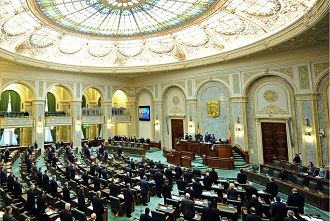 Senators adopted on Wednesday the draft for amending the Code of Criminal Procedure, by 74 votes for to 28, against.
Senators adopted on Wednesday the draft for amending the Code of Criminal Procedure, by 74 votes for to 28, against.
The bill goes to the Chamber of Deputies, which is the decision-making body in this case.
The amendments were approved last week by the Special Committee for the laws on the judiciary and contain almost all the controversial amendments submitted by the PSD-ALDE coalition.
All these debatable changes are in favour of suspects or even convicts for criminal offenses, as none of them is formulated for the benefit of the victim.
They will complicate investigations, and some provisions voted will even allow for some final sentences to be changed.
Provisions with high impact
- An amendment that applies retroactively to completed trials – If the court decision was signed by a judge who was not in the formation of the court during the trial, the decisions can be reviewed. The provision will allow PSD leader Liviu Dragnea to remove the suspended sentence he received in the Referendum Case from his criminal record.
- The appeal court cannot cancel the sentence of the first court which orders for discharging the defendant unless the new evidence is submitted. This new evidence must be evidence that would lead to the dissolution of the discharge solution in the first court to invalidate the reasons for which the discharge was ordered.
- The length of the prosecution process is limited to one year, which is unique in the world. If prosecutors fail to sue the person concerned during this time, then the file is closed. „Within one year since starting the criminal prosecution on the offense, the criminal investigative body shall be obliged to proceed either with the initiation of the criminal prosecution in on the person, if the legal conditions for ordering such measure are fulfilled, or with the closing of the case at the limitation period.” The amendment is unique in the world and contravenes regulations on the limitation period – for example, there is no limitation period for the acts in murder cases, but if this paragraph appears in the law, a crime will de facto subject to a time-limit of one year after it is committed. Specifically, one year becomes the limitation period for all offenses.
- Regarding the whistle-blowers who benefit from the provisions on the reduction of the punishment limits, they must make the report within maximum of six months from the date when they became aware of the offense.
- Intercepted and recorded conversations, discussions or communication that do not concern the offense investigated cannot be used or attached to the criminal prosecution file.
- Video or audio recordings made by third parties or the persons concerned can no longer be used by the judicial authorities. After the criticism made by magistrates, the coalition introduced an exception – the surveillance cameras, as well as the filming/recordings made in public places, can be a means of proof. The exception was introduced after the magistrates gave the case from the metro as an example of a possible effect – the case of a woman who killed a young woman pushing her on the rails just before the train arrived and she was identified and prosecuted because of the surveillance cameras that captured the crime.
- During the criminal prosecution, public disclosure of any information relating to the acts and persons subject to the proceedings is prohibited. „During the criminal prosecution or the trial, the criminal investigation authorities or the court may publicly disclose details of the criminal proceedings only when the data provided justifies a public interest provided by the law or that is necessary in the interest of discovering and finding out the truth in the cause”. This exception was introduced on Thursday, also following the criticism from the magistrates – we would have been the only country in the world that could not have the faces and identity data of people wanted at the national or international level displayed during the investigation, but only after the conviction. For example, in the case of a terrorist attack.
- Criminal suspicions are no longer sufficient to trigger criminal proceedings, but „solid evidence” is needed. Similarly, technical supervision is ordered by the judge of rights and freedoms when there are reasonable indications of a crime being prepared or committed.
- The arrest becomes illegal if the person is not convicted or if the act is decriminalized, which will put pressure on the magistrates because they will be accountable in such situations. „This is very serious, because the rationale for the preventive arrest, for example, is one, and the rationale for conviction is something different,” explained the USR Deputy Stelian Ion.
- The hearing of a person cannot take longer than 6 hours in 24 hours, and the 6-hour periods cannot be consecutive as an interval of 12 hours is required between them.
- Judicial control cannot exceed 190 days (30 plus 160), which will allow those who want to escape or even delay the prison sentence enforcement to leave the country, given that it is impossible to complete the investigation and the trial within this term.
- Preventive arrest can only be ordered if the evidence shows that the defendant has committed an offense and there is one of the following three situations: the defendant fled to evade the prosecution or the trial, he made any kind of preparations for such acts, the defendant attempts to influence another participant in committing the offense, a witness or an expert, or to destroy, alter, hide or evade material evidence or make another person to have such behaviour; he exerts pressure on the injured party or tries to make a fraudulent deal with her; if there is a reasonable suspicion that, after the criminal action started against him, the defendant intentionally committed a new offense or is preparing a new offense.









